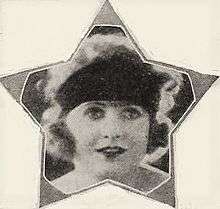Ruth Hiatt
Ruth Hiatt (January 6, 1906 – April 21, 1994) was an actress in motion pictures beginning in the silent film era. She is known for performing in 1920s comedies directed by Jack White, Norman Taurog, and Mack Sennett.
Ruth Hiatt | |
|---|---|
 | |
| Born | January 6, 1906 Cripple Creek, Colorado, U.S. |
| Died | April 21, 1994 (aged 88) Montrose, California, U.S. |
| Resting place | Forest Lawn Memorial Park (Glendale) |
| Occupation | Film actor |
| Years active | 1915-1941 |
Child actress
Hiatt was born in Cripple Creek, Colorado. Hiatt made her film debut at the age of nine with the Western Lubin Company in San Diego, California. She made two two-reel comedies The Inner Chamber (1915) and The Vigilantes (1918). Afterward she returned to high school which she completed around 1922.
Film comedian
As teenager she was discovered by comedian Lloyd Hamilton. She became his leading lady at United Artists studios in 1922. Hiatt was a former classic dancer who was Hamilton's successor to Irene Dalton. Their first work together is the short comedy The Speeder (1922).
Hiatt played a street urchin in support of Hamilton in Lonesome (1924). In the role she wears high top shoes which were once worn by United States Senator Harry Lane of Oregon. Lane discarded them at the home of his cousin, cartoonist Pinto Colvig.
In Smith's Baby (1925) Hiatt is the female lead with Raymond McKee. Sennett cast Hiatt and McKee with Our Gang child star Mary Ann Jackson in 1927. The short comedies continued the Jimmy Smith series with titles like Smith's Pony (1927), Smith's Cook (1927), Smith's Cousin (1927), and Smith's Modiste Shop (1927). The movies were produced by Pathe Pictures. Jackson and McKee teamed with Hiatt and Hoot Gibson in The Flying Cowboy (1928).
Hiatt appeared in the second chapter of the Ken Maynard Sunset Trail (1932) serial entitled Battling With Buffalo Bill. Maynard's horse, Tarzan, was in this story of the open range before the army and law enforcement established themselves in western cattle towns.
Hiatt's film career endured through 1941. Some of her later appearances were in the Three Stooges comedy Men In Black, the Our Gang entry Beginner's Luck, Just Speeding (1936) and Double Trouble (1941).
Modeling career
In August 1922, Hiatt modeled for Beckman Furs of West 7th Street in Los Angeles, California. She won first prize for beauty at the annual Venice Beach bathing beauties parade in August 1923. She wore a costume of black and white checkered silk, with hat and slippers that matched. The Western Association of Motion Picture Advertisers (WAMPAS) selected Hiatt among its thirteen baby star actresses for 1924. Blanche Mahaffey, Carmelita Geraghty, and Clara Bow were also chosen. Hiatt was blonde but one reporter covering the WAMPAS banquet in San Francisco, in December 1923, wrote that she was brunette.
Death
Ruth Hiatt died in Montrose, California in 1994 of congestive heart failure.
Private life
Hiatt had a toy poodle known professionally as Georgette. She maintained a diet of lamb chops and pineapple together with strenuous daily exercise. Hiatt's personality was vivacious, yet modest, almost to the point of being shy.
References
- "Ruth Is A Permanent Wife-In The Movies". Cedar Rapids Tribune. May 20, 1927. p. 2.
- "How They Suffer for Their Art". Fresno Bee. September 5, 1926. p. 36.
- "Lloyd Hamilton Busy". Los Angeles Times. July 2, 1922. p. III17.
- "Miss Ruth Hiatt". Los Angeles Times. August 12, 1922. p. VIII4.
- "New Leading Woman". Los Angeles Times. August 13, 1922. p. III30.
- "Girls Reveal Well--What?". Los Angeles Times. August 20, 1923. p. II1.
- "Bevy of Baby Stars of Filmland". Los Angeles Times. December 17, 1923. p. II1.
- "Actress Dons Vacated Shoes of Statesman". Los Angeles Times. March 30, 1924. p. 31.
- "Mack Sennett's Trio". Los Angeles Times. July 2, 1925. p. A9.
- "Child Actress Grows Up To Film Success". Oakland Tribune. December 3, 1922.
- "Ken Maynard And Thrilling Serial Chapter At Majestic". Sheboygan Press. February 6, 1932. p. 13.
External links
- Ruth Hiatt on IMDb
- Ruth Hiatt at Find a Grave